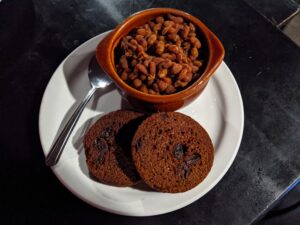By Sharon Oliver, Contributing Writer

BOSTON – Imagine living through the 1775 Siege of Boston, fully aware of the historical accounts of food scarcity. In fact, food shortages during that era were often the root cause of many heartbreaking and violent events such as food being blockaded by the British or requisitioned by the colonial army. Between 1776 and 1779, 30 food riots broke out in colonies. These riots were frequently led by women in Boston and Beverly who were struggling to feed their families while the men were off at war.
Roots in colonial times
First Lady Abigail Adams reported on one that occurred in 1777 wherein an angry crowd of Boston women demanded the keys to a warehouse from merchant Thomas Boylston. He refused. Adams wrote, “a number of females, some say a hundred, some say more, assembled with a cart and trucks, marched down to the warehouse, and demanded the keys, which he refused to deliver.” When Boylston stood up to the women, “one of them seized him by his neck and tossed him into the cart. Upon his finding no quarter, he delivered the keys, when they tipped up the cart and discharged him, then opened the warehouse, hoisted out the coffee themselves, put it into the trucks and drove off.”
Adams also repeated a rumor that the women had spanked Boylston, her husband’s first cousin once removed. Despite all the upheaval, there was one food staple many depended on for sustenance—beans. The specific ingredient used that separates Boston baked beans from all the rest is molasses. Initially, the sugary substance was shipped to Boston to make rum. However, it was not until the 19th century, when famed culinary expert Fannie Farmer included Boston baked beans in her cookbook, that molasses was considered an accepted ingredient, along with ground mustard and salt pork. Boston was the epicenter of molasses and rum production in the U.S.
Cultural influence
Food historians tend to debate the origin of baked beans. Nevertheless, Boston’s version of the recipe is certainly beloved and is the reason Boston is called “Bean Town” even though other nicknames include “The Athens of America,” “The Cradle of Liberty,” and “The Hub of the Universe.” According to legend, merchants and sailors on the triangular route began calling the city “Bean Town” after more and more taste buds were enlightened by this method of preparation. The popularity of Boston baked beans is the reason there are four major U.S. ice hockey teams who compete in the annual Beanpot tournament. It is the basis behind the 1920s tourist slogan, “You don’t know beans until you’ve bean to Boston.” In 1993, the Massachusetts General Court determined the Navy bean had been the original bean used in the venerable Boston Baked Bean recipe.
As for the origin of baked beans, some claim that indigenous people taught Puritan settlers how to bake beans in an earthenware pot. Since Puritans did not work on the Sabbath, they would bake the beans for Saturday night supper, along with brown bread, then take the beans, still warm from staying inside the oven, and serve them for breakfast the next morning.
New England has a rich history when it comes to the background of baked beans with each region having its own story. Many in New Hampshire and Vermont prefer to add maple syrup to their recipe. Deemed an ideal source of protein for hungry lumberjacks, folks in Maine prefer the bean-hole baked beans method of cooking the beans over hot coals in a hole in the ground. Nonetheless, when you add it all up, Boston baked beans are clearly celebrated. So celebrated, they even named a candy after it.
RELATED CONTENT:
Nothing said Yankee comfort food like Durgin-Park (fiftyplusadvocate.com)
Our fondness for fluffernutter is forever (fiftyplusadvocate.com)
Necco’s sweet journey of creating classic candies began in Boston (fiftyplusadvocate.com)












